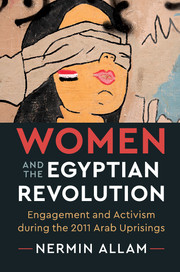Crossref Citations
This Book has been
cited by the following publications. This list is generated based on data provided by Crossref.
Hafez, Sherine
2020.
Gendered dissent in the Arab uprising: The challenges and the gains.
European Journal of Women's Studies,
Vol. 27,
Issue. 4,
p.
348.
Allam, Nermin
2020.
Arab Spring.
p.
135.
Biagini, Erika
2020.
Islamist Women’s Activism under Morsi’s Government (2011-2013): Political Inclusion, Gender and Discourse.
Égypte/Monde arabe,
p.
37.
Jamal, Manal A
2022.
Troubled Comparative Trajectories and the Statistical Construction of Disempowered Arab and Muslim Women Subjects.
International Studies Review,
Vol. 24,
Issue. 4,
Allam, Nermin
2022.
The afterlife goes on: The biographical consequences of women's engagement in the 2011 Egyptian uprising.
Digest of Middle East Studies,
Vol. 31,
Issue. 4,
p.
380.
Allam, Nermin
2023.
Women’s Unveiling in the 2011 Egyptian Uprising: Political Opportunities and Modesty Politics.
Politics & Gender,
Vol. 19,
Issue. 3,
p.
734.
Ali, Zahra
2023.
The Political in Iraq’s Thawra Teshreen.
Journal of Middle East Women's Studies,
Vol. 19,
Issue. 3,
p.
401.
BOLAT, Eren
2023.
SOCIAL STIGMATIZATION AND PENALIZATION OF WOMEN IN SAADAWI’S THE FALL OF THE IMAM.
Folklor Akademi Dergisi,
Vol. 6,
Issue. 1,
p.
378.





